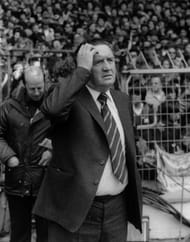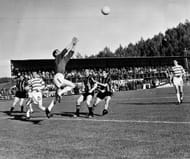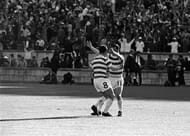Another European final, and to not many people’s surprise, Helenio Herrera’s Inter were the clear favourites to lift what would be their 3rd European Cup..
Celtic F.C, under Jock Stein, were a killing machine that were on a rampage domestically. Since the Scot took over the reigns in 1965, Celtic won 9 straight domestic titles, till his resignation in 1974. However, Stein’s Celtic grabbed all headlines across the world in the 1966-67 campaign, when the club was led to an unprecedented treble. The Scot inherited a group of players who lived within a 30 mile radius of Celtic Park. Stein’s team boasted of an indomitable team spirit, and the boys from Glasgow had already won every trophy put in front of them. On the other hand, Helenio Herrera’s Inter had become the face of Italian football, and were on their way to winning 3 consecutive European Cups, a feat that had not been achieved by any club till then. The stage was set for Inter to achieve the unthinkable, and for Celtic to stage one of the grandest upsets in the history of European football.
Ernie Wilson recalls:
“When Celtic got through we just couldn’t believe that our team was going to play in the European Cup final. Even if we didn’t win, the thought of just being there was just terrific. Even friends who were Rangers supporters were wishing me luck when they heard that I was going. They told me not to come back to Glasgow without the trophy.”
The build-up to Lisbon
After the success enjoyed in previous seasons, Herrera’s Inter were expected to do it all over again by fans and admirers alike. And they weren’t left disappointed, as after knocking out Real Madrid en route to Lisbon, the Italians were overwhelming favourites to lift the European Cup for a record third time.
On the other hand, Celtic dominated the footballing scene in Britian. Under Jock Stein, they were slowly turning into a European powerhouse. After securing a spot in the 1966-67 European Cup by winning the Scottish League the season before, Jock Stein embarked upon a journey which would forever remain etched in footballing history. No one expected Celtic to come as far as they did, but once they did, there was no looking back. The 90 minutes that were to follow were the most defining moments in the history of the club.
Billy McNeill, captain of Celtic, said:
“We were so relaxed on the night before the game. There was a lad called Brodie Lennox who had a country club not far from the hotel and he’d invited us to his house. He put on a meal for us and we watched England play against Spain on his television. We walked back the hotel afterwards.”
The Grand Night
Billy McNeill recalled the team-talk delivered by Jock Stein at the team hotel, who said just before they left for the Estadio Nacional:
“You know it’s been a wonderful season and this can be a season that we can all look back on with great fondness. It can be the best season of our careers.”
The match was tipped as a battle between two contrasting styles – Inter’s uber-defensive approach (famously termed as the Catenaccio) vs Celtic’s free-flowing approach, which had the single objective of scoring goals. It was all set up to be an enthralling battle of wits, as two tactical masterminds commanded the technical areas of both sides.
In the tunnel leading to the field of play, the Celtic players looked tensed, and showed clear signs of nerve. Jimmy Johnstone recollected:
“I thought we’d get a right gubbin’. I can see them yet standing alongside us in the tunnel waiting to go out on the pitch: Facchetti, Domenghini, Mazzola, Cappellini, all six-footers wi’ Ambre Solaire suntans, Colgate smiles and slicked-back hair. Each and every wan o’ them looked like yon film star Cesar Romero. They even smelt beautiful.”
When Sandro Mazzola converted the penalty won by Capellini, for a foul on him by full-back Jim Craig, hardly anyone would have given Celtic a chance to muster up a comeback. Inter were known to keep slender leads for long periods of time, and Catenaccio was in full swing now. The wall of Inter restricted Celtic to limited chances in the form of shots from outside the box. The whistle blew.
Half Time: Inter 1-0 Celtic.
Celtic continued to push bodies forward in the second half, and continued to dominate possession. Inter were content to sit back and absorb all the pressure. Ultimately, the persistence of the men in white and green paid off. Just after the hour mark, a thunderous drive from Tommy Gemmell breached the meanest defence of those times. Celtic had achieved the improbable. Scoring against that Inter backline was an achievement in itself.
A sense of confidence and urgency swept through the Celtic ranks, as Jock Stein’s men grew into the game even more. They now started to find gaps and holes in the Inter backline. The masters of defence were now under siege, and Celtic put the final nail in Catenaccio’s coffin in the 84th minute, when Bobby Murdoch’s deflected shot was turned into the net by striker Steve Chalmer. Catenaccio had fallen…Inter were in doldrums.
The sound of the final whistle could not have been any sweeter to the ears of the Celtic players and fans, and most importantly, their manager. On the other hand, Herrera witnessed his empire crumbling, and his team in tatters.
A jubilant Celtic, led by Billy McNeill, lifted the European Cup, and ended Inter’s dominance on the continental front.
Post Match Reactions
Lisbon daily Mundo Desportivo summed up the final in the most appropriate way:
“It was inevitable. Sooner or later the Inter of Herrera, the Inter of Catenaccio, of negative football, of marginal victories, had to pay for their refusal to play entertaining football.”
The side which heroically defeated Inter at the Estadio Nacional were famously proclaimed to be the ‘Lisbon Lions’ – which signified the self-belief and the spirit portrayed by the team on the grand night. Later, Bill Shankly congratulated Stein, proclaiming that the Scot had become ‘immortal’ after his side’s Herculean achievement.
Bobby Lennox, one of the integral members of the Lisbon Lions, said:
“That just proved to Europe that we were the best team. We entered five tournaments that year and we won all five of them.”
The Lisbon Lions have since remained forever in Celtic’s history. One of the stands at Celtic Park has been renamed ‘Lisbon Lion Stand’ in honour of that team, and another stand has been renamed the ‘Jock Stein Stand’ in honour of the manager who assembled the great side. European football has for long been dominated by the likes of Ajax, Bayern Munich, Barcelona and Real Madrid, but Celtic’s fairytale story is certainly not the last time an underdog took everyone by storm.




